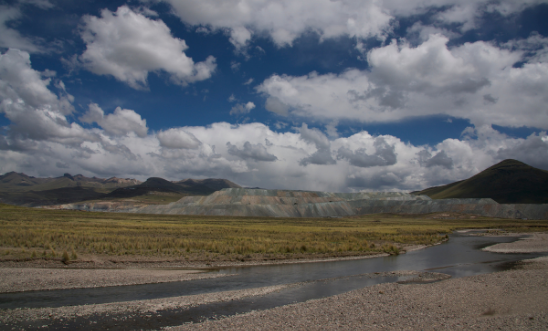
Press releases
Peru: Evidence confirms indigenous communities in Espinar exposed to toxic metals pollution - new report

Mining project owned by Anglo-Swiss transnational Glencore PLC blamed for health crisis in Espinar
Nearly 60% of people found with arsenic in their bodies putting them at risk of cancer
‘We are dying, we are losing our families, we are losing our livestock. The government has not helped us at all’ - Gerson López
The government of Peru is failing to protect members of the Indigenous K'ana People’s communities in Espinar who are exposed to mercury, lead, arsenic, cadmium and other toxic metals, said Amnesty International today (18 May).
Amnesty’s 46-page report - Failed state of health: Health emergency in Indigenous Peoples of Espinar, Peru – was written in collaboration with Derechos Humanos Sin Fronteras, a human rights defenders organisation in Peru, and environmental health expert Fernando Serrano, from Saint Louis University, Missouri.
Researchers analysed 11 Indigenous communities between 2018 and 2020 located in the areas directly affected by the Antapaccay Expansión Tintaya - Integración Coroccohuayco mining project, owned by the Anglo-Swiss transnational Glencore PLC.
For years, people affected have complained about disease, pollution, lack of safe clean water and medical care, yet the response from the Peruvian authorities has been slow and inadequate.
Blood and urine samples were collected from 150 volunteers from the communities. The results showed that 78% (117 people) of samples contained dangerously high levels of metals and toxic substance, representing a severe risk to their health.
Findings from the report
- More than 58% had elevated levels of arsenic in their bodies, which can cause nausea and vomiting, a decrease in the number of red and white blood cells, as well as abnormal heartbeat.
- More than 29% had elevated levels of manganese in their bodies, which can be toxic and build up in the brain, bones, liver, kidneys, and pancreas.
- More than 12% had elevated levels of cadmium in their bodies, which can lead to kidney disease, lung damage and brittle bones.
- More than 4% had elevated levels of lead in their bodies, which can affect almost every organ and system in the body. The effects of lead include anaemia and high blood pressure; kidney damage, weakness in the fingers, wrists, and ankles; and high levels of lead can cause severe brain damage.
- More than 3% had elevated levels of mercury in their bodies, which can be toxic to the nervous system, to the immune system, and the digestive system, as well as the skin and lungs, kidneys, and eyes. Exposure to mercury, even in small amounts, can cause serious health problems.
The report also documents other problems that the communities are exposed to, such as environmental pollution as well as lack of access to drinking water and an adequate standard of living.
The Ministry of Health (MINSA) established that by 2020 more than 31% of the population were at risk of exposure to heavy metals and other chemical substances, more than 20% to metalloids such as arsenic and more than 6% to hydrocarbons.
Gerson López, a 22-year-old merchant from the Alto Huancané community suffers from nausea, vomiting and frequent cramps in his hands and feet and his family suffers from rare diseases that doctors have not been able to explain. Gerson said:
“We are dying, we are losing our families, we are losing our livestock.
“The government has not helped us at all – they have forgotten about us. We are asking for health and respect for the environment. I want to make the most of my life because I only have one life.”
Erika Guevara-Rosas, Americas Director at Amnesty International, said:
“The evidence is clear - communities in Espinar are facing a health crisis that requires an urgent and robust response from the government.
“The authorities must act now to ensure communities have access to healthcare.”
Marina Navarro, Executive Director of Amnesty International Peru, said:
“Espinar is experiencing a double health crisis today, due to the pandemic and pollution.
“People living with metals and toxic substances in their bodies should not be the norm. This is a situation that must be resolved without delay and with a guarantee that it will not be repeated.”
Government’s failure to address the health crisis
The Peruvian government has denied the communities of their right to health by failing to monitor and treat the health problems of people affected.
They have also failed to address the right for people to know the cause of the contamination, how metals and toxic substances have entered their bodies and what the plan for mitigation and redress is to ensure that this does not happen again.
Court judgement
On 30 December 2020, the Cusco Superior Court issued a final judgment, which is not subject to appeal, ordering MINSA to design and implement a Public Health Strategy for the Health Emergency in Espinar related to exposure to metals and toxic substances.
No response from the government
On 20 April 2021, Amnesty sent the results of the research to the President of the Council of Ministers and MINSA, giving them a chance to respond. To date, no response has been received.